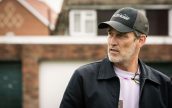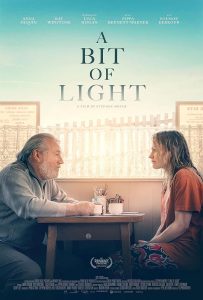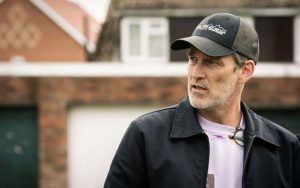Based on Rebecca Callard’s award-winning play, A BIT OF LIGHT is a film that encompasses grief, hope, and a peculiar friendship.
Anna Paquin portrays Ella, a working-class Englishwoman who, at age thirty-nine, has moved back in with her dad. Anna has lost custody of her two little girls to their father Joseph (Yousef Kerkour) and his partner Bethan (Pippa Bennett-Warner). Anna is allowed to have her children with her for a few days here and there, but she feels such guilt over what she did while they were with her that she can barely function. She spends her days sitting alone at a park.
Then Ella is approached by not-quite-fourteen-year-old Neil, played by Luca Hogan. Luca is extremely perceptive and absolutely insists on getting into Ella’s life, no matter how much she tries to push him away.
A BIT OF LIGHT is the second feature film directed by Stephen Moyer, who previously helmed THE PARTING GLASS. He is also a producer on both movies.
As an actor, Moyer, originally from Essex, England, has an extensive background on the English stage. Although he has a long resume in film and television, he is perhaps still best known for playing the vampire Bill Compton on seven seasons of HBO’s TRUE BLOOD, which also starred Paquin; the two married in 2010. Paquin is also a producer on A BIT OF LIGHT.
More recently, Moyer starred in Fox’s THE GIFTED, costarred in Paramount Plus’s series SEXY BEAST, a prequel to the 2000 feature of the same name (Moyer plays the younger version of Ian McShane’s character in the movie) and guest-starred on the premiere episode of CBS’s ELSBETH.
Moyer gets on a Zoom call to talk about making A BIT OF LIGHT. He explains, “I read online that my friend Rebecca Callard had won an award for this play [in] a playwriting competition, the biggest one in the U.K., called the Bruntwood. It was judged by Russell T. Davies. Russell had written a show called THE GRAND that me and Rebecca had been on. She had entered the competition anonymously, so Russell did not know that it was her that had written the play. It was the first thing she’d ever written.
“I’d just had [THE PARTING GLASS] out at the Edinburgh Film Festival. She had seen a really positive review of that. So, it was really lovely – ‘Oh, my God, you’re directing,’ ‘Oh, my God, you’re writing.’ We ended up in a situation where, ‘I’ll show you mine if you show me yours,’” he laughs.
“She sent me the play. And I was just blown away by it, I just thought it was so wonderful and so deep and so sad and funny and full of hope. And talking about things that I’m interested in – mental health and addiction.”
Moyer wanted to option A BIT OF LIGHT, but someone else beat him to it. “We waited a couple of years, and when the rights became available again, I was able to get them.” Callard adapted the screenplay, and is one of the film’s executive producers, as well as having a small role as a coffee shop proprietor. “The one thing that Rebecca was unsure about [initially] was that Anna was too young, because she’d written it for somebody who was specifically thirty-nine/forty, going through that second stage of life. When we started shooting, Anna had just turned thirty-nine.”
THE PARTING GLASS is also about family trauma. Moyer sounds bemused that, as a filmmaker, he seems to be specializing in the subject. “I had a very blissful childhood,” he laughs.
Moyer came to direct THE PARTING GLASS because it was written by his TRUE BLOOD costar Denis O’Hare. “We were very, very close.”
TRUE BLOOD was the start of Moyer’s for-camera directing career. He helmed three episodes, starting with Season 5’s “Somebody That I Used to Know,” in which he, Paquin, and O’Hare all appeared. “When I was directing [O’Hare], something happened. I’d been working with him as [a fellow] actor, and just being blown away by him and astonished by him, but there was this weird moment where I was directing, and I was sitting next to Mark Hudis, who had written that episode, and I remember it clear as day. Denis did something that was so incredible in a performance beat, and I turned to Mark, and I said, ‘I want to make my first film with Denis in the lead.’
“Denis and I sat down and talked. I got a couple of ideas, he got a couple of ideas. He was writing a lot, and he said, ‘Well, here’s something that happened to me,’ and he told me the story of this weekend where his family had gone in their cars to meet up in Missouri, where his sister had died. It had been this caravan of comedy and sadness, and I thought it was a really beautiful story, and I guess I was drawn to the idea of a family coming together for a sad reason, but growing and responding to this family crisis by becoming more cohesive.
“And then, when I read Rebecca’s script, I immediately leapt at it. So, I wouldn’t have said before that that I was particularly drawn to family trauma, but it seems I am.”
Moyer considers this statement, and qualifies it. “I am writing something about my childhood, and when one is excavating, and thinking about specific stuff, there were certain things that happened in the village with different families, and different friends, and different friends’ parents, that I suppose do play a kind of key role in one’s own growing up, even though, if you asked any of my mates during that period of time what our childhood was like, it was just this wild, fun-filled festival of nonsense, of us all being really, really silly. So, it is interesting, as you go back and look, you go, ‘Oh, actually, when we were fourteen, that happened to So-and-So’s mum,’ or ‘Blah-Blah’s dad left the town.’”
Ray Winstone plays Ella’s dad Alan, who gave up his own drinking habit cold turkey. Alan loves his daughter, but doesn’t know how to communicate with her. How did Moyer arrive at casting Winstone in the role?
“He was very, very high up on our list, but he was one of the people that we thought was un-gettable. But it just so happened that Ray’s agent had read some of Rebecca’s writing, because Rebecca was a writer on BREEDERS, the Martin Freeman show. He loved it, because her episodes of BREEDERS are very, very funny, and she’s really brilliant. And so, when the script came through, he went, ‘I know that name, I want to read this.’ And he saw that Anna was attached to it, and he loved it, and he got in touch with us immediately, and said, ‘I want you to speak to Ray about this.’ And then Ray and I ended up on a Facetime together, and it was just wonderful, and he was on board, and I couldn’t believe it. It was amazing.”
Moyer is a major Winstone fan. “I’d known Ray’s work since I was a kid. I was obsessed with him, because of SCUM, Alan Clarke’s [1979] movie. Gary Oldman’s [1997] NIL BY MOUTH as well [which also starred Winstone] was such an extraordinary film. I was like twenty-six, twenty-seven when I saw that, and I was really blown away by that. And of course, SEXY BEAST [Winstone starred in the original 2000 feature]. I was in the middle of the edit for A BIT OF LIGHT when I got offered the series of SEXY BEAST for Paramount Plus, and I got in touch with Ray, and I said, ‘You’re not going to believe this,’ and Ray couldn’t have been more supportive. I absolutely love him.”
As Winstone is frequently cast in very violent roles, was the quiet, thoughtful Alan a pleasing change of pace for him?
“Yeah. That was one of the things I said to him. ‘I think you can do anything. The reason that I thought of you for this …’ There are a couple of moments in NIL BY MOUTH where that violent, angry, awful human that he plays shows this terrified child underneath. and I said, [Alan is] like him twenty years later, but sober and with no friends, and isolated. He totally understood what I was talking about, and I think he really did enjoy playing Alan.”
Moyer notes that there was also some synchronicity between Winstone playing the father of thirty-nine-year-old Ella, as in real life, Winstone’s has three daughters. The eldest, Lois, had just turned thirty-nine when production began on A BIT OF LIGHT, and the youngest is named Ellie Rae. “He calls his daughter ‘Els.’ So, he called Ella ‘Els’ straight away. It’s a very British thing to shorten everybody’s name. It’s a form of British people showing you that they like you, and that they feel a connection to you.”
To find a young actor to play Neil, “We saw a bunch of people, and if I’m a hundred percent honest about it, I didn’t know quite what I was looking for to begin with. When I first read it, I felt like he was a Dickensian waiflike little kid. Luca was quite robust. It was COVID times, so I saw tapes first, maybe ninety to a hundred. We had a short list of ten, straight away.
“There was something about Luca’s delivery – Luca just says the words. It’s not that they’re not infused with meaning, but he doesn’t try to infuse them with meaning. Neil speaks in this mature way. And he’s also very direct, and it’s what makes the play so funny, and what I think makes the screenplay funny, is that he just says the thing that people would not normally say. And Luca was able to do that and make it feel very authentic.”
For all Neil’s forthrightness, his uncanny awareness of facts he shouldn’t be able to know and his knack for showing up in the right place all the time suggests that he may be something other than a mere mortal. Since Neil interacts not only with Ella, but also with Alan, Joseph, Bethan, and others, we know he’s not an imaginary figment, but what exactly is he?
“Well, here’s the thing,” Moyer replies. “I don’t want to tell the audience what he is. I know what he is to me, but I want the audience to walk away wondering. What I will say is that I feel that Neil has been put on the Earth to help people. He is the only person in the park who doesn’t have another person looking after him, and when Ella goes to that park to look at other children, in order to punish herself, she feels like she can’t be seen.
“So, when he gets around to finally talking to her, she can’t believe that somebody’s talking to her, because she thinks she’s invisible. She thinks that she’s so broken that people can’t take her in, and yet, there’s this kid, and he has taken it upon himself to put her back together, that that is his quest. And in so doing, he comes into contact with everybody that’s in her life. And in certain ways, he positively affects all of their lives by making them confront things that they might not necessarily have confronted. So, I think he is there to bring about Ella’s forgiveness of herself.
“We discussed making it more obvious what Neil was, but I’m a big fan of [Canadian filmmaker] Atom Agoyan. He just gives you the information. He never tells the audience what his point of view is. I just thought it was really important that Ella is in this place in her life where she’s made some destructive choices and decisions, and she’s grieving for the life that she’s given up. She feels guilt for what she’s done to these kids, she doesn’t feel that they deserve to have been treated like this, she just doesn’t feel that she deserves to be a mother. She’s not going to kill herself, because that would cause more trauma for them. So, she’s in this limbo.
“And so, when this kid comes along, she doesn’t understand what he would possibly want with her, either, which is why she fights for him not to be there, but he brings something to her. After [Ella and Neil’s] first meeting, Alan says to her, ‘What’s happened to you? What’s going on?’ Because she wants to eat chocolate. And he’s like, ‘Something’s happened.’ And something has happened. There’s this tiny little window that’s been opened, where there’s a tiny, tiny pinprick of light at the end of the tunnel, and Neil is that light.”
Moyer’s directorial vision opened up A BIT OF LIGHT for the screen from its theatrical origins. However, weather caused some abrupt changes in plans.
“We’re shooting in October in the U.K., and we’ve got bright sunshine,” Moyer recalls with a laugh. “Who would have thought that that was possible, right? So, in those sequences, costume-wise, we’ve put everybody in this park in big winter clothes, so that it brings attention to the fact that Neil is just in a shirt, right? I was able to pivot and go, ‘Okay, the park’s beautiful, the park is gorgeous, and lush, and sun-filled, and green, and if you go and study color theory, and you look at the colors that he’s wearing, and that other people are wearing around, Ella’s in her monochromatic look, but everybody else is full of color.”
Other adjustments were due to finances and bureaucracy. “It was originally set in London, and so, the trip to Scarborough was a slightly bigger thing. It’s a miniscule budget we were working with. So, some of that trip that I wanted us to see, we weren’t able to do. There was a whole section I had to cut about being in Scarborough Castle. I found out the night before. I’d scouted Scarborough Castle, and we were supposed to be in Scarborough Castle on the penultimate day of the whole shoot. It’s seven o’clock when we finish shooting on the night of the beach scene. My producer came and told me that we didn’t have the castle, that English Heritage wouldn’t give it to us.
“By the way, the whole of the story leads to that point, on the castle. There’s a moment – it’s not this, but it’s like the ‘I’m the King of the World!’ moment in TITANIC. And so, we had to pivot. That’s what indie film is about, right? And so, we all traipsed up this hill, with all of our equipment, in the dark that night, and found that bench that the scene takes place on, and went, ‘Okay, they’ve come to Scarborough, and they’ve not been able to get in.’
The point is, of course, when you actually come down to it, the most important thing is that Ella has defied her dad, she has got up in the morning after the argument that they’ve had, and she has gone to Scarborough with Neil, which is everything that she’s not supposed to do. Because the following day, she’s getting her kids back [for the school holidays]. So, the last thing that her dad wants her to do is create this situation where it might be felt as weird that a grown woman is taking an about-to-be-fourteen-year-old boy on a trip.
“So, even though we didn’t get the castle, it doesn’t matter, because she has made that choice, which is, again, self-sabotage, even though she’s chosen to go with Neil to do something kind for Neil, she’s also doing something which is again getting in the way of something that would be good for her, because she doesn’t feel like she deserves to be good, or to be well. And she doesn’t feel like she deserves her children. So, it’s a very specific choice.”
What does Moyer hope viewers get out of A BIT OF LIGHT?
“It’s this story about family, it’s this story about forgiveness. I’m a big believer in second and third chances, and what Neil is trying to do is show Ella that she is maternal, that she does have feelings, that she does have the possibility to look after her children, that her previous choices aren’t going to define her the rest of her life.” She says to him, ‘You should have a jacket on. Aren’t you cold?’ And so, all the way through, she’s doing that. And he’s pointing out to her, ‘You see? You are a good mum. You’re worried about me.’
“She’s starting to be able to show empathy again, and that’s exactly what he’s there to help her do. So, empathy, emotional connection, forgiveness, retribution, kindness, all of those things. And hope. Ultimately, I think it’s a film that is about hope, and it’s about extending a hand to somebody who is in need. Whether that person chooses to take your hand or not is up to them, but you have to put your hand out in order to find out.”
Follow us on Twitter at ASSIGNMENT X
Like us on Facebook at ASSIGNMENT X
Article Source: Assignment X
Article: Exclusive Interview: Director Stephen Moyer on helming his second feature film A BIT OF LIGHT
Related Posts:













